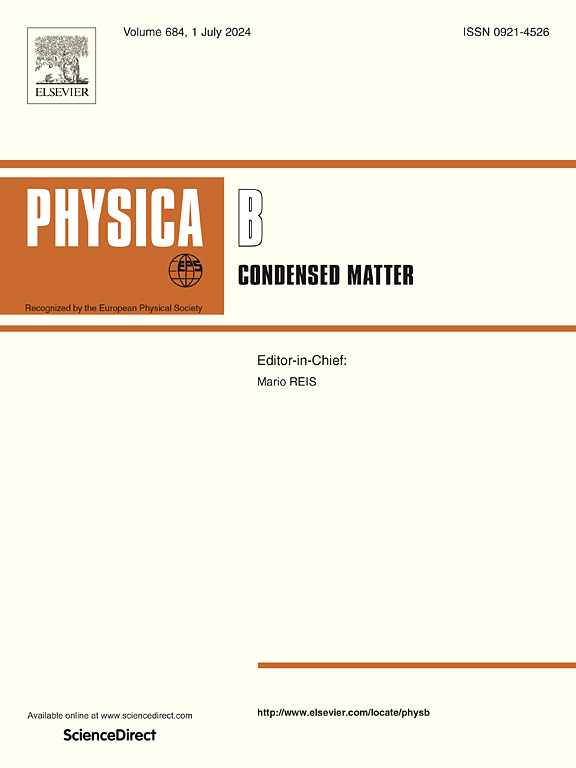Pressure-dependent properties of muoniated radicals in an electron acceptor crystal studied using avoided level crossing muon spectroscopy
IF 2.8
3区 物理与天体物理
Q2 PHYSICS, CONDENSED MATTER
引用次数: 0
Abstract
Muon spin spectroscopy is a powerful tool for probing magnetism and electron configurations in materials. In the electron acceptor TCNQ, implanted polarised positive muons form radicals with a delocalised unpaired electron. Using avoided level crossing (ALC) spectroscopy under pressures up to 6 kbar, we observed upward shifts in resonance fields, suggesting an increase in muon hyperfine coupling constant . First-principles calculations with quantum corrections identified two muon addition sites: a bridging carbon and a terminal nitrogen. Statistical analysis of relaxed structures from random muon positions showed how site basins of attraction change with pressure, revealing a shift in site populations. Simulated ALC spectra using DFT parameters reproduced the observed shifts. This indicates the pressure-dependent resonance shift arises not from a direct change in , but from redistribution between muon sites due to modifications in the local energy landscape.
用避免水平交叉的介子光谱研究了电子受体晶体中介子自由基的压力依赖性
μ子自旋光谱是探测材料磁性和电子构型的有力工具。在电子受体TCNQ中,植入极化的正介子与离域不成对电子形成自由基。在高达6 kbar的压力下,使用避免水平交叉(ALC)光谱,我们观察到共振场向上移动,表明μ子超精细耦合常数增加。量子修正的第一性原理计算确定了两个μ子添加位点:桥接碳和终端氮。对随机介子位置的松弛结构进行统计分析,揭示了地点吸引力盆地如何随压力变化,从而揭示了地点种群的变化。利用DFT参数模拟的ALC光谱再现了观测到的位移。这表明压力相关的共振位移不是由μ的直接变化引起的,而是由局部能量格局的改变引起的介子位之间的再分布引起的。
本文章由计算机程序翻译,如有差异,请以英文原文为准。
求助全文
约1分钟内获得全文
求助全文
来源期刊

Physica B-condensed Matter
物理-物理:凝聚态物理
CiteScore
4.90
自引率
7.10%
发文量
703
审稿时长
44 days
期刊介绍:
Physica B: Condensed Matter comprises all condensed matter and material physics that involve theoretical, computational and experimental work.
Papers should contain further developments and a proper discussion on the physics of experimental or theoretical results in one of the following areas:
-Magnetism
-Materials physics
-Nanostructures and nanomaterials
-Optics and optical materials
-Quantum materials
-Semiconductors
-Strongly correlated systems
-Superconductivity
-Surfaces and interfaces
 求助内容:
求助内容: 应助结果提醒方式:
应助结果提醒方式:


